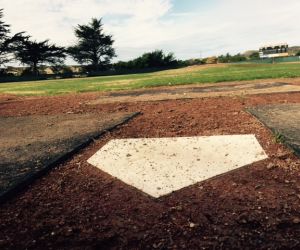Down The Middle

“A little less shoulder, a little more hips.” I’m throwing batting practice in early February. Nothing new bout that, except we’re outside. The Seaside Spartans have started official practices and I’m assisting Coach Beza.
The batter is powerfully built, but he’s swinging completely with his upper body. I’m sure that used to work at lower levels of baseball, but he’s going to have to get his lower body into the swing. That’s the foundation for a good season at the plate at this level. Hence, the suggestion.
The rule of thumb for coaching kids is to offer ten pieces of positive reinforcement for every piece of constructive instruction. Kids fixate on the negative, so watch what you say. Combine the 10:1 rule of thumb with the inherent failure rate at the plate, and the subtle approach of “a little more this, a little less that” is the best way to go. It’s just the second day of practice, so I’m doing my best to groove the balls right down the middle of the plate. It’s second nature at this point, as routine as spinning a ball in my hand to get the right grip.
Earlier in the day, another second nature kicked in. The department heads are gathered and we’re discussing some long-standing public records requests. My basic question is why haven’t we responded and there’s a variety of answers, which all boil down to Monterey Downs is big, complex and may not be universally loved, so some auxiliary legal review steps were created.
I’m still new round these parts, adjusting to outdoor February baseball and some of the more interesting items left out of the recruitment brochure, but I have the sense big, complex and may not be universally loved aren’t mentioned as reasons to delay release of public records in California law. We have that discussion as a team and I offer up a bit of advice along two lines.
First, let’s be proud of the work we’re doing and be open about. Stamping “confidential” on a sheet of paper doesn’t make it so, so let’s be circumspect in using that designation. Working in the public trust, there are legitimately confidential documents and processes to minimize City liability. Those are fine, and spelled out in law. But scribbling “draft” on something doesn’t make it confidential, nor should it. The evolution of thought contained in draft documents is itself pertinent to public policy development.
Second, no matter the size, complexity and universality of the love surrounding a project or policy, staff is here to be neutral, professional and prompt. Records requests that languish for months do nothing to help public policy development, or the City’s reputation. Looking forward, rather than backward, let’s be leaders in open, engaged local government.
That may seem a little more difficult, and a little more theoretical than “a little less shoulder, a little more hips”. But not really. The foundation of success at the plate is your lower body. The foundations of success in local government are open, agile, impactful and friendly processes. The tendency in responding to a big, complex, unloved pitch is to take an unbalanced swing. The tendency in responding to a big, complex policy question in local government is to create auxiliary processes that can unbalance the foundation of public policy, which is openness.
That’s my pitch to the Seaside team at City Hall. Here’s hoping it goes as well as the pitches last night.
Threw to the whole team. Didn’t hit anyone.
A non-esoteric update: Moving forward, Seaside will end the added step of outside legal review of public records requests related to Monterey Downs. We’ll also start working on how to post public records act request responses to the new City website (nearing completion) so everyone can have access to what is requested and hold a training session on prompt replies best practices. A little farther in the future, we’ll run the experiment of automatically posting e-mails to and from my e-mail address to the City’s website.

